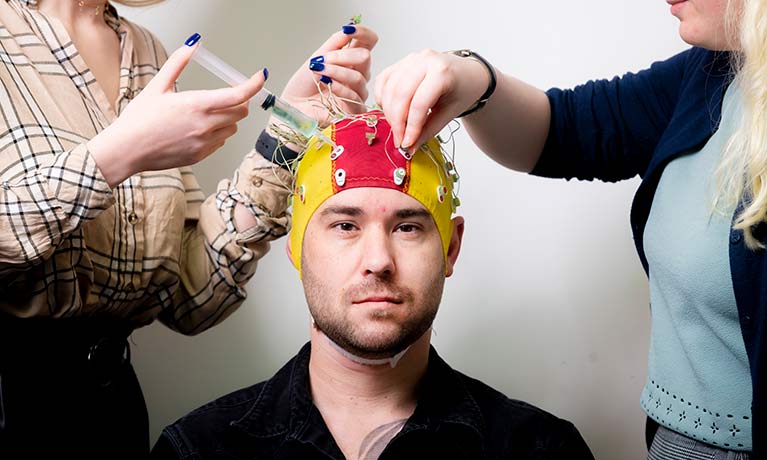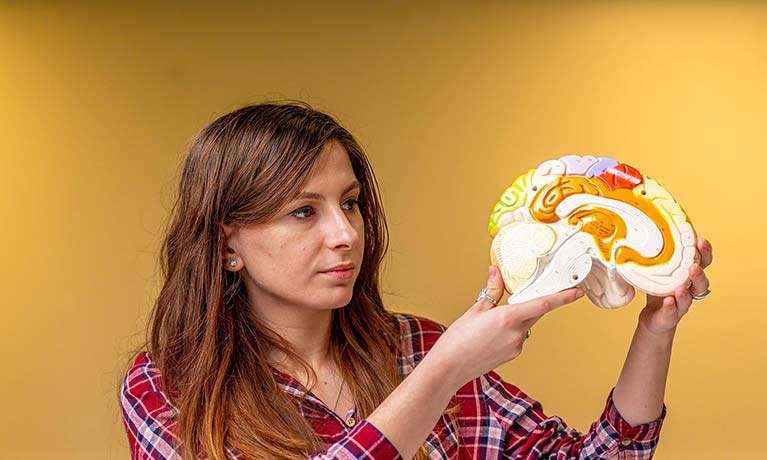Search
Psychology with Counselling BSc (Hons)
Study level: Undergraduate
Understand the human mind and explore counselling theory and techniques while developing employability skills that would help you progress in a range of careers.
Year of entry
Location
Coventry University (Coventry)
Study mode
Full-time
Sandwich
Duration
3 years full-time
4 years full-time (study abroad or work placement)
Condensed first year available
Course code
C801
Start date
September 2026
The information on this page is for 2025-26 entry and should be used as guidance for 2026-27 entry. Please keep checking back on this course page to see our latest updates.
Course overview
Cultivate knowledge and skills that meet the growing demand for mental health and wellbeing services, as well as transferable skills in research and critical thinking which are increasingly sought after by employers globally.
- Develop an understanding across all areas of psychology and explore specialist modules on topics like mental health, wellbeing and the art of applying core counselling skills.
- Immerse yourself in learning environments which bring counselling to life. Engage in realistic counsellor-client interactions through role plays, within international contexts, fostering practical skills in a supportive environment.
- Master the tools of research in psychology, learning how to conduct rigorous research while upholding ethical standards. Equip yourself with methodological and analytical skills to excel in the dynamic field of psychological research.
The January start for this course is condensed in the first year. Please see the ‘How you’ll learn’ section below for more details.
Rated Gold Overall
Teaching Excellence Framework (TEF) 20235 QS Stars for Teaching and Facilities
QS Stars University RatingsTop 5 Student City in England (Coventry)
QS Best Student Cities Index 2025Why you should study this course
- Explore the practical applications of psychology and counselling in real-world scenarios, encompassing diverse cultures and global contexts. Develop valuable and transferable skills like empathy and active listening, which are valued in various professional fields.
- Emphasise employability by honing practical skills such as core counselling techniques and cognitive abilities like critical analysis, problem-solving, and leadership.
- Engage in Collaborative Online International Learning (COIL) projects, fostering international awareness through cross-cultural communication and peer collaboration with students from participating institutions (subject to availability).
- Recognised as one of the Top 300 in World Rankings for Psychology (Times Higher Education World University Rankings by subject 2022).
- Enjoy the flexibility of switching to one of our other British Psychological Society -accredited degree programs in your second year if your interests or career aspirations change (subject to meeting progression requirements).
If you choose to start this course in January you will study exactly the same course but over a slightly shorter timescale in your first year. This is ideal if you missed the September start, want to transfer from a different university or course or just need a bit more time to prepare for life at university.
in World Rankings for Psychology
Times Higher Education World University Rankings by subject 2022
Accreditation and professional recognition
This degree is professionally accredited by the British Psychological Society (BPS).

The British Psychological Society
This course is accredited1 and recognised by the British Psychological Society (BPS). (BPS) on an open-ended basis, subject to regular and ongoing review by the BPS. Accreditation by the British Psychological Society means that as a graduate, provided you achieve at least a 2:2, you will be eligible for the Graduate Basis for Chartered Membership (GBC). Additional costs may apply. Please check with the membership body for details.
If the accreditation of this course changes, we will seek to notify applicants and students as soon as possible.
More than just a degree
A well-designed course that usefully prepares students for progression towards a professional qualification in either Clinical or Counselling Psychology, along with other specialist training in the field. The core emphasis on the development of counselling skills is invaluable and will be of benefit to graduates in a wide range of career areas. More specifically, this degree will provide an ideal launch pad for anyone contemplating a career in the mental health profession.
Gwion Jones, Clinical Director, Worcester Therapy Group, 2023

What you'll study
We regularly review our course content, to make it relevant and current for the benefit of our students. For these reasons, course modules may be updated.
How you'll learn
The course utilises a broad range of teaching and learning strategies providing students with an immersive experience. For example, you will be given opportunities to develop your core counselling skills in several different ways (e.g. peer-to-peer role play, use of actors as mock clients and simulated scenarios). This course is taught using a mixture of lectures, group seminars and practical ‘hands-on’ skills workshops. Core course content will be delivered during the lectures, while seminars and workshops offer opportunities for you to explore topics more independently, receive guidance on coursework assignments, begin to apply your knowledge and develop your academic, transferable skills and core counselling skills.
You will have the opportunity to take part in the design, conduct and analysis of psychological experiments, and spend time working collaboratively on group projects with other students. Your Student Success Coach will be available for one-to-one bookable meetings throughout your degree (subject to availability) and will review and discuss your progress and continual personal development. Outside of contact time, your personal study hours will be guided by materials posted on your module web pages.
Many of our students undertake work experience and field trips to support their practical learning. We aim to arrange optional international field trips each year for our undergraduate psychology students2. See 'Fees and funding' section for further information.
If you choose to start this course in January it will be run as a condensed programme. You’ll start your course in January and finish your first year in August. Upon successful completion of your first year, you will progress onto your second year in September and then continue to start subsequent years of your course in September, completing your degree at the same time as the September starters unless you opt to do a placement year.
Teaching contact hours
As a full-time undergraduate student, you will study modules totalling 120 credits each academic year. A typical 20 credit module requires a total of 200 hours study. This is made up of teaching contact hours, guided and independent study.
Teaching hours:
Teaching hours vary each semester, year of study and due to module selection. During your first year you can expect 15-18 teaching hours each week. You will also have the option to attend optional sessions including time with a progress coach or to meet with staff for advice and feedback. As you progress through your studies, teaching hours may reduce.
Guided and independent study:
Throughout your studies, you will be expected to spend time in guided and independent study to make up the required study hours per module. You'll be digging deeper into topics, review what you've learnt and complete assignments. This can be completed around your personal commitments. As you progress through your studies, you'll spend more time in independent study.
Online learning:
As an innovative university, we use different teaching methods including online tools and emerging technologies. So, some of your teaching hours and assessments may be delivered online.
Assessment
This course will be assessed using a variety of methods which will vary depending upon the module. The assessment methods may include:
- formal examinations
- phase tests
- essays
- group work
- presentations
- reports
- projects
- coursework
- exams
- individual assignments.
The Coventry University Group assessment strategy ensures that our courses are fairly assessed and allows us to monitor student progression towards achieving the intended learning outcomes.
Embarking on the journey of understanding the complex workings of the human mind is an undertaking that not only shapes your own future but also empowers you to positively impact the lives of others. Our new Psychology with Counselling BSc (Hons) course is a transformative pathway that ignites a passion for knowledge, compassion, and personal growth.
Join us on a journey of intellectual curiosity in an environment where critical thinking, rigorous analysis and compassionate inquiry converge, as we explore the realms of human behaviour and unlock the endless possibilities of creating a brighter, more connected world.
Dr Michelle De Voy (Deputy Course Director, Psychology with Counselling BSc (Hons), 2023

Entry requirements
Typical entry requirements:
Fees and funding
| Student | Full-time | Part-time |
|---|---|---|
| UK, Ireland*, Channel Islands or Isle of Man | 2026/27 fees TBC 2025/26 fees: £9,535 per year |
Not available |
| EU | 2026/27 fees TBC 2025/26 fees: £9,535 per year with EU Support Bursary** 2026/27 fees TBC 2025/26 fees: £18,300 per year without EU Support Bursary** |
Not available |
| International | 2026/27 fees TBC 2025/26 fees: £18,300 per year |
Not available |
If you choose to study this course with a professional placement2 or study abroad year, you will need to pay a tuition fee3 to cover your academic support throughout your placement year. Students commencing their professional placement in the academic year 2027/28 will pay £1,500 if they are paying UK fees, or £1,800 if they are paying international fees.
For advice and guidance on tuition fees and student loans visit our Undergraduate Finance page and see The University’s Tuition Fee and Refund Terms and Conditions.
The University will charge the tuition fees that are stated in the above table for the first Academic Year of study. The University will review tuition fees each year. For UK (home) students, if Parliament permits an increase in tuition fees, the university may increase fees for each subsequent year of study in line with any such changes. Note that any increase is expected to be in line with inflation.
If you choose to study this course with a professional placement, the University will charge the tuition fees stated above for those on a placement during Academic Year 2027/28. The University will review professional placement tuition fees each year. For UK (home) students, the University may increase fees for each subsequent year of study, but such that it will be no more than 5% above inflation.
For international students, we may increase fees each year, but such increases will be no more than 5% above inflation. If you defer your course start date or have to extend your studies beyond the normal duration of the course (e.g. to repeat a year or resit examinations) the University reserves the right to charge you fees at a higher rate and/or in accordance with any legislative changes during the additional period of study.
We offer a range of International scholarships to students all over the world. For more information, visit our International Scholarships page.
Tuition fees cover the cost of your teaching, assessments, facilities and support services. There may be additional costs not covered by this fee such as accommodation and living costs, recommended reading books, stationery, printing and re-assessments should you need them. Find out what's included in your tuition costs.
The following are additional costs not included in the tuition fees:
- Any optional overseas field trips or visits: £400+ per trip.
- Any costs associated with securing, attending or completing a placement (whether in the UK or abroad).
Condensed course – January start date
If you choose to start this course in January please make sure you check the Fees and Finance page for more information. Although starting this course in January does not prohibit you from being eligible for student finance, the way it is paid in your first year differs from those who start their course in September.
If you start the course in January, your tuition fees will be paid in accordance with the university’s Tuition Fees, Refund and Withdrawal Terms and Conditions for January starters and for any further years of study, your fees will be paid in accordance with the terms for September starters.
*Irish student fees
The rights of Irish residents to study in the UK are preserved under the Common Travel Area arrangement. If you are an Irish student and meet the residency criteria, you can study in England, pay the same level of tuition fees as English students and utilise the Tuition Fee Loan.
**EU Support Bursary
Following the UK's exit from the European Union, we are offering financial support to all eligible EU students who wish to study an undergraduate or a postgraduate degree with us full-time. This bursary will be used to offset the cost of your tuition fees to bring them in line with that of UK students. Students studying a degree with a foundation year with us are not eligible for the bursary.
Facilities
This course is taught at Coventry University’s main campus.
- Specialist teaching facilities include light and dark multi-sensory laboratories, ‘mock’ prison cells, an observation suite, and counselling rooms which allow you to experience the application of psychology in different contexts.
- Specialist software such as Gorilla, Opensesame experiment builder, E-Prime, SPSS statistical analysis, Pinnacle Studio and NVIVO are used to develop your digital fluency.
- EEG (electroencephalogram), eye tracking and virtual reality headsets allow you to understand and experience the neuro-cognitive aspects of human behaviour in different situations.
Facilities are subject to availability. Access to some facilities (including some teaching and learning spaces) may vary from those advertised and/or may have reduced availability or restrictions where the university is following public authority guidance, decisions or orders.
Careers and opportunities
Our courses equip you with a range of skills and competencies that could set you apart from other graduates and make you attractive to potential employers (e.g. critical thinking, communication skills, core counselling skills, leadership and creativity).
This course can provide the necessary grounding to help you progress to undertake further training to become a qualified psychologist. In doing so you may be able to pursue a rewarding career in the community, for example, as an occupational, forensic or social psychologist; in mental wellbeing as a clinical or counselling psychologist; in physical wellbeing as a health, sport or neuropsychologist or working with children as a developmental or educational psychologist. Qualifying as a psychologist will be subject to further training, application and registration which may incur additional costs and have eligibility criteria.
Where our graduates work
We aim to equip our graduates with highly sought-after employability skills required to embark on a career in applied psychological settings (e.g. mental health secure settings, rehabilitation centres); or complete one of our postgraduate degrees. However, the transferable skills you gain from your degree opens several options for career pathways. Our students across the psychology suite of courses have also become researchers, lecturers, teachers, administrators, managers and health and care professionals.
Further studies
Students who successfully complete their Psychology with Counselling BSc (Hons) degree with a minimum 2:2 award will normally be eligible for most Applied Psychology MSc programmes at Coventry University (e.g. Forensic Psychology MSc, Health Psychology MSc, Applied Psychology MSc, Business and Organisational Psychology MSc) and other institutions with related courses. Please check individual course pages for full details.

Discover Phoenix+
Phoenix+ brings you together with other students to learn, experience and develop essential knowledge and skills. Whatever destination you choose, it's about preparing you for life after university.
Learn more about Phoenix+How to apply
You may also like

Psychology BA (Hons)

Forensic Psychology BSc (Hons)






